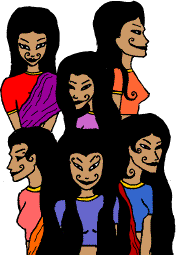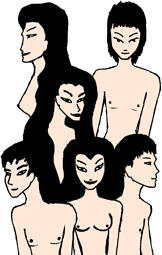


The male lilin (or lili) and the female liliths are the demon children of Lilith. Along with her, they are given the right to plague newborn children until they are clean, eight days for a boy until cicumcision, and twenty days for a girl. During this time they are the prey of the lilin and the liliths. Women in certain times of life are also the prey of women. When they are still virgins, during menstruation (a reflection of Jewish ideas of purity). Pregnant women also fall under the domain of the Lilin, and both pregnant women and newborns have to be protected. If a man is not pure in his thought when lying with his wife, and thinks of another woman, his child is fair game to the lilin and the liliths. Amulets were created with the names of three angels who in the Lilith mythology were sent to drown Lilith, but she convinced them that it was her purpose to prey on children. The lilin are the incubi and the liliths the sucubi of Jewish mythology. They prey not only upon children, killing those unprocted (in return for the death of a hundred of Lilith's demonic children dying a day), but they also prey upon men and women for sex. The Jewish laws against masterbation and nocturnal emmisions are reflected here, the lilin and liliths can use these to create more children to swell their ranks. These incubi and succubi can attach themselves to men and women, and to get rid of them it is necessary to obtain a writ of divorce. They are jealous of human partners, and as well as murdering children they can cause barenness, miscarriages, and complicaions during childbirth.
The Matrkas are the siblings of Kali. There are also born of Durga, although these children of Durga do not have as much indivdual identity. They are seen more as a group, whose numbers are often in a state of flux. They prey upon children. They are the bogeyman under the bed that might take your child in the night and strangle it. They are not the bogeymen for children so much as they are for parents. The constant fear that your child may stop breathing in the night, a sickness that pads in on silent feet and steals a child away, the high infant mortality rate, these are the Matrkas. In many cultures there are the strange, usually women, who prey on small children and newborns. In a culture without advanced medicine and inoculations children die at a high rate, and often these unfair deaths are blamed on fictional women outside the society who steal them for their own, or are jealous of anyone's children. In such an unfair situation, you have to blame someone, accepting the death of a child is always hard. They prey upon children until they reach the age of sixteen, when they go through a reversal and become protectors. What does not kill you makes you stronger. Once a child survives their initiation into adulthood they fall under the Matrkas protection. Then they become benevolent surrogate mothers to these almost-adults, after the children have survived their vengeful rage at not having children of their own (or being scorned by their husbands, or just being goddesses who were born out of Durga's bloodlust and chose children as their victims). After sixteen children have passed through the greatest dangers, they are usually strong enough to survive more diseases than they would have otherwise, and the weaker children rarely would make it to that age. So turning the Matrkas into protectors acknowledges this, no longer are the children in as much danger, so their old enemies have turned into friends, strengthening them for adulthood.
The form of the preyer upon children is a common motif. Usually they are some sort of demon women, but not always. But there is the common string of those dangerous to small children, those who prey upon babies and the small defenseless ones. Children are more prey to disease, and the silent theives in the night that steal their lives away need to be given faces, some reason for the deaths. The death of a child is always hard, and at least then there is some sort of a reason, something to rail against, something to direct your anger towards. For otherwise there is no point, and dispair is just that much closer.






